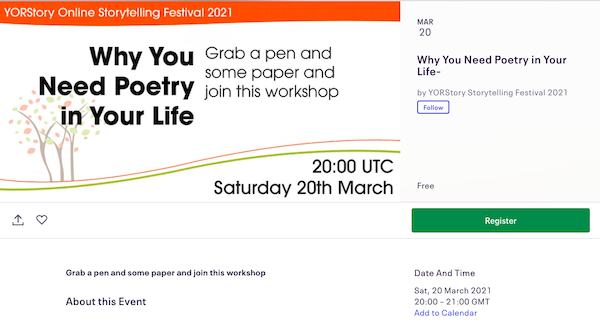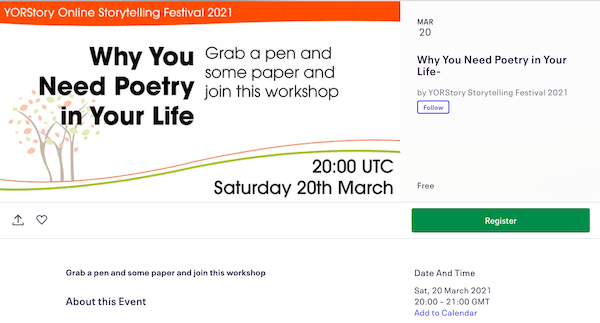
Better short notice than no notice! At 8pm tomorrow evening, Saturday the 20th, I’m giving a free one-hour workshop on Why You Need Poetry in Your Life. It’s part of YORStory, a brand-new festival aimed at bringing creatives and business types together.
But wait! My event will be (I hope) interesting for everyone from business types to people who are just thinking they’d like to write, to experienced poets. I’ve got some fresh angles, kids. Tell your friends. Bring a pen and paper.
I’m going to be talking about three ways poetry can help anyone in their life, and that means you — and it’s bound to help you at work, too, no matter what you do for a living.
There are three ways in which poetry is bound to help you if you let it. You don’t really even have to write it, just reading it might be good enough. ‘it works its magic through language, which is written through us like a stick of rock whether we know it or not.
The three ways poetry can help you are solid, not just pie in the sky:
-
It can help you see the world better
-
It can help you say what you mean
-
It can help you persuade people
When Plato wrote his Republic he famously banned poets. And artists. He said poets are twice removed from reality and tell lies. Socrates, whether real or a fictional character Plato made up to argue with (which would technically put Plato in the ‘poets’ camp) said that poets had to be a bit mad, that we’re basically at the mercy of the demigod Eros, for whom we act like lightning rods, writing in a ‘frenzy’. Even Björk, looking inside her television in a viral video, concluded, ‘Don’t let a poet lie to you’.
But the reason for this badmouthing is because poetry has superpowers. It makes people feel things, and see things differently. There may be a platonic ideal of a chair, and there may be a real (if you believe in empirical reality) person making a chair, and the poet or writer may be the one who just comes along and describes the chair — but we all know that until that’s happened, no one’s really sure what the chair is. I think, while we’re on the subject of philosophers, somebody like Wittgenstein wouldn’t even consider it a chair at all until we knew how to talk about it.
So first of all, let’s ask: what is poetry? It’s a form of language. In fact, it’s many different forms of language. And as we all use language, both personally and often professionally, I always think it’s a good idea to think about what it is and how it works. Some people think it’s about flowers and butterflies and has to rhyme. Others think it’s just something that’s hard. Some poets I know call it ‘patterned language’. Some talk about its closeness to music. It seems to be more or less hardwired into being human: all cultures have it, children speak in it, and the oldest known written documents are poems.
Poems are literally what turns pre-history into history. They were records of stories, things that had happened. They, and cave paintings, are what tell us about our earliest ancestors, well before we have any trace of their business dealings. We were born, as a species, with twin desires: to tell, and to make it beautiful.
Poetry is also where language goes to see what it’s capable of. It’s a playground, a yoga mat, a gym for language. This is what the experimentalists are up to. Just like mad scientists, who seem to have so little to do with your friendly local pharmacist, they are busy making connections and inventing things that the rest of us might use one day. But as with any gym, it has a lot of rooms.
A business communications student in a workshop session once told me why he hated it: ‘It’s too dream for me’ — and went on to produce the best poem in the room later, full of wonderful particulars.
The poet WH Auden wrote, ‘Poetry makes nothing happen’, in the elegy he wrote for another great poet, WB Yeats. But there’s more to what he meant than that. Here’s what he wrote:
For poetry makes nothing happen: it survives
In the valley of its making where executives
Would never want to tamper, flows on south
From ranches of isolation and the busy griefs,
Raw towns that we believe and die in; it survives,
A way of happening, a mouth.
Can you see where we’re getting? This is almost a map. Note how he uses the word mouth in two different ways at once. That’s poetry, and also magic. He creates a river, without ever using the word river, and then reminds us that with only our power of words — our mouth — we can influence the course — the course, like a river’s course — of people’s thoughts, and thus of what people do.
So my webinar tomorrow is going to be about exactly that: why executives should tamper here, and why everyone in the raw towns should believe in it. And it will help you get a little more of that power for yourself.
Have a look at YORStory, or sign up directly for my event on Eventbrite. Hope you can make it!
